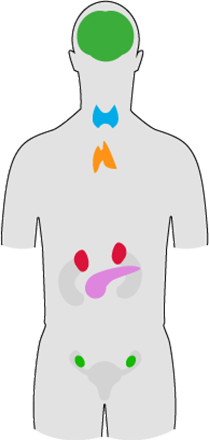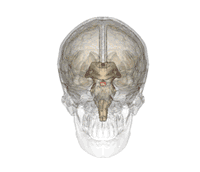show/hide words to know
Gland: an organ that releases materials for use in certain places in the body or on the outside of the body... more
Target organ: an organ that is able to respond to a hormone.

Hormones
- A girl who is about to give a speech in front of her class gets nervous – her palms are sweaty, her heartbeat and breathing quicken, and she feels jittery.
- A body builder takes drugs that help make his muscles grow bigger.
- A man who has diabetes loses weight, and he feels queasy and exhausted.
What do these scenarios have in common? Hormones! We all need hormones for our bodies to function properly. Hormones help us process energy, respond to changes in our environment, reproduce, maintain the right balance of nutrients, and perform many other vital functions.
Hormones are chemicals produced by specialized organs called glands. Several glands are pictured here, with descriptions of the hormones they make. Once a hormone is released by a gland, it travels through the body in the blood, in search of a target. A target organ must have special receptors that recognize and bind to the hormone. This interaction allows hormones to have specific effects in the appropriate areas of the body.
You can place your pointer on any colored gland or organ in the picture above to learn more.
The Thyroid Gland produces thyroid hormones that affect energy processing. People whose thyroid hormone levels are too low feel tired and sluggish. In children, very low thyroid hormone levels can cause retarded brain development and stunted growth.
The thyroid gland needs a substance called iodine in order to make thyroid hormones, and too little iodine in the diet may cause the growth of a large lump on the thyroid called a goiter. Decades ago when people had less iodine in their diets, goiters were more common, but now that we get plenty of iodine from iodized salt these lumps are relatively rare. [top]
The Adrenal Glands produce several different hormones. Epinephrine and cortisol help you cope during stress. Like the nervous girl about to give a speech, if we are confronted with a difficult or scary situation, our epinephrine and cortisol levels go up.
- Epinephrine, also known as "adrenaline," stimulates the "fight or flight" response. Part of this response includes increased heart rate, blood pressure, and breath rate, which helps our bodies prepare to face a stressful event successfully.
- Cortisol makes energy available during stress by causing sugar to be released into the blood. Cortisol also suppresses some energy-consuming functions - such as reproduction, growth, digestion, and immunity - that take a lower priority than fighting or fleeing during a critical moment.
- Aldosterone is yet another hormone that comes from the adrenal glands. Its role is to help maintain the right salt concentration in our bodies. When salt in our diet is too low, this hormone makes us conserve all the salt we've got. In some animals it may also cause salt cravings. [top]
The Pancreas is the source of two hormones that regulate sugar levels in the blood, insulin and glucagon. After you eat, insulin makes your body store sugar from the food for future use. A few hours later when your blood sugar has gone down, glucagon causes that stored sugar to be released back into the blood so it can be used as energy.
Diabetes is a disease caused by an insulin shortage or defective insulin receptors. Many people with this illness must give themselves insulin injections to keep their blood sugar levels from getting too high. When it is uncontrolled, diabetes may lead to other dangerous health problems, such as increased risk of heart attacks, strokes, and blindness. [top]


The Gonads (OVARIES in women and TESTES in men) are essential reproductive organs. They produce eggs and sperm, the cells that join to form an embryo. Gonads also make reproductive hormones. Testes produce testosterone, and ovaries produce estrogen and progesterone. These hormones are necessary for the growth of eggs and sperm. In addition, they cause the development of some of the characteristics that make men and women look different from each other.
One of the well known effects of testosterone is that it stimulates muscle growth. For this reason, some athletes and body builders take testosterone or similar drugs, called "anabolic steroids," to help them build bigger, bulkier muscles. However, these drugs have other dangerous side effects, and their use is illegal. [top]
The Thymus Gland is part of the immune system. The thymus makes a hormone, called thymosin, that stimulates the growth of certain immune cells. These cells, called T cells, help keep us healthy by attacking virus-infected or cancerous cells.
The role of the thymus is most important during early development of the immune system in infants and children. In adults the thymus grows smaller, and thymosin secretion progressively wanes. [top]
The Brain is an important target organ for hormones. For instance, testosterone can cause changes in aggressive behavior by binding to receptors in the brain. But the brain is also a gland! In fact, it is considered a hormone "control center" because it affects hormone release in several other parts of the body. Using its own hormones, the brain communicates with our other glands to make sure the levels of thyroid hormones, cortisol, testosterone, progesterone, and other hormones are just right! [top]
Computer animation credit: BodyParts3D, Copyright© 2010 The Database Center for Life Science licensed under CC Attribution-Share Alike 2.1 Japan.
View Citation
Bibliographic details:
- Article: Hormones
- Author(s): Danika Painter
- Publisher: Arizona State University School of Life Sciences Ask A Biologist
- Site name: ASU - Ask A Biologist
- Date published: December 18, 2009
- Date accessed: April 17, 2024
- Link: https://askabiologist.asu.edu/hormones
APA Style
Danika Painter. (2009, December 18). Hormones. ASU - Ask A Biologist. Retrieved April 17, 2024 from https://askabiologist.asu.edu/hormones
Chicago Manual of Style
Danika Painter. "Hormones". ASU - Ask A Biologist. 18 December, 2009. https://askabiologist.asu.edu/hormones
Danika Painter. "Hormones". ASU - Ask A Biologist. 18 Dec 2009. ASU - Ask A Biologist, Web. 17 Apr 2024. https://askabiologist.asu.edu/hormones
MLA 2017 Style

Take a look at the tiny red area in the brain. This is the pituitary gland. It is the smallest part of your brain and controls growth.
Be Part of
Ask A Biologist
By volunteering, or simply sending us feedback on the site. Scientists, teachers, writers, illustrators, and translators are all important to the program. If you are interested in helping with the website we have a Volunteers page to get the process started.








